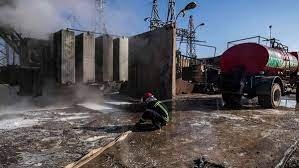
In a profound escalation of tensions within the tumultuous realms of the Middle East, Iran’s Revolutionary Guards have orchestrated a series of ballistic missile offensives across the landscapes of Iraq and Syria. Their claimed target is the purported epicenter of Mossad, Israel’s esteemed intelligence bastion. These strategic assaults have not only sounded alarms regarding the upsurge in hostilities but have also triggered contemplation on the broader implications for global geopolitical equilibrium.
Iran’s Unleashed Fury of Missiles: A Surgical Strike
The Revolutionary Guards, with unwavering determination, unleashed a barrage of ballistic missiles upon the northern territories of Iraq and Syria. Official statements maintained a focus on espionage hubs, with a discernible emphasis on what has been cryptically referred to as the Mossad nerve center. The Revolutionary Guards staunchly asserted that these assaults served as a rebuttal to alleged intelligence machinations orchestrated by Israel within the region’s convoluted landscapes.
Erbil, the capital of Iraq’s semi-autonomous Kurdistan region, found itself within the crosshairs of Iran’s allegations, purportedly housing the clandestine headquarters of Israel’s espionage network. The scope of these missile strikes extended beyond borders, permeating into Syria, targeting locations branded by Iran as multiple “terrorist” enclaves.
Global Backlash and Censure
The international community swiftly responded to this orchestrated symphony of destruction. The United States, in a formal declaration, castigated Iran’s actions, expressing apprehension regarding the surge in violence within the region. The acknowledgment by the U.S. government that the targeted sites purportedly harbored Israeli intelligence installations in both Iraq and Syria only intensified the global discourse surrounding this development.
This recent turn of events has not only strained the delicate fabric of Iran-Israel relations but has also woven an additional layer of intricacy into an already labyrinthine geopolitical panorama. The strikes in Kurdistan, a region historically entwined with geopolitical sensitivity, have cast a spotlight on the potential repercussions of this conflict spiraling beyond national confines.
Geopolitical Repercussions: Escalation Amidst the Middle Eastern Quagmire

Iran’s ballistic onslaught has injected a potent accelerant into the ongoing cauldron of geopolitical tensions within the Middle East. This region, perennially engulfed in political and military tumult, witnesses multiple actors vying for dominion and authority. Iran’s precise targeting of the alleged Mossad nerve center has amplified concerns regarding the involvement of external intelligence apparatuses in the ongoing theatrics in Iraq and Syria.
This latest development has raised queries about the potential roles of other regional stakeholders and the potential impact on the delicate equilibrium of power within the Middle East. The Syrian conundrum, already a tapestry of competing interests, is poised to endure heightened complexities in the wake of these ballistic maneuvers.
Mossad: In the Crosshairs of Iran’s Fury
The mention of Mossad as the primary target of Iran’s ballistic reprisal beckons contemplation on the nature of intelligence endeavors within this region. Mossad, Israel’s sentinel intelligence agency, renowned for its clandestine exploits and acquisition of pivotal information safeguarding Israel’s security, now finds itself at the epicenter of Iranian animosity and suspicion concerning Israeli intelligence maneuvers in Iraq and Syria.
While Mossad has chosen silence in the face of these allegations, the targeting of its purported headquarters underscores the mounting tensions between Iran and Israel. The trajectory of Israel’s response to these unfolding events remains shrouded in uncertainty, leaving the specter of retaliatory actions looming overhead.
Humanitarian Quandaries on the Horizon
As hostilities intensify within the theater of Iraq and Syria, apprehensions regarding potential humanitarian fallout loom large. The areas subjected to targeted aggression, including Erbil and various Syrian locales, house civilian populations whose daily lives teeter on the precipice of disruption due to the ongoing turmoil. The global community, alongside humanitarian organizations, remains vigilant, scrutinizing the situation and gauging the imperative for assistance in these strife-ridden regions.
The specter of heightened violence could usher in augmented displacement and anguish for the civilian denizens ensnared in the crossfire. It becomes imperative for the international community to reckon with the humanitarian consequences and diligently pursue diplomatic avenues to de-escalate this perilous situation.
Diplomacy in Action: Striving for De-escalation
In the aftermath of the ballistic maelstrom, diplomatic overtures are in progress, seeking to address the crisis and chart pathways toward de-escalation. The United Nations, regional entities, and concerned nations engage in deliberations, endeavoring to unearth peaceful resolutions to the conflict. The significance of dialogue and diplomacy cannot be overstated, particularly considering the potential repercussions of protracted and heightened conflict within the Middle East.
The role of diplomatic conduits emerges as pivotal in forestalling further unraveling of the situation, fostering an atmosphere conducive to negotiations. The world watches attentively as key regional players, Iran and Israel among them, navigate these diplomatic endeavors, contemplating the viability of meaningful dialogue in the shadow of escalating tensions.
Navigating the Ambiguous Landscape
Iran‘s ballistic salvo, homing in on the alleged Mossad nerve center in Iraq and Syria, has thrust the region into an abyss of uncertainty and precarity. The ramifications of these missile volleys transcend the immediate conflict, casting shadows upon regional stability, diplomatic ties, and the destinies of civilians ensnared in this unfolding drama.
As the international community grapples with the aftermath of these ballistic reverberations, the urgency for diplomatic resolutions and de-escalation intensifies. This situation serves as a stark reminder of the fragile nature of peace in the Middle East and the intricate interplay of global security dynamics.

In the days ahead, diplomatic endeavors are poised to gain momentum, with the hope that discourse and negotiation will triumph over the specter of heightened military strife. The world observes with bated breath as the Middle East navigates these uncharted waters, recognizing the imperative of seeking peaceful resolutions to the labyrinthine challenges that define its geopolitical landscape.











Comments 1